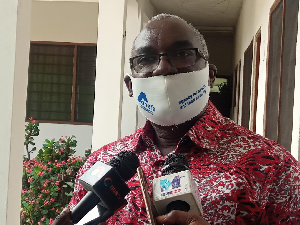 Dr Kodjo Mensah-Abrampa, Director-General, NDPC
Dr Kodjo Mensah-Abrampa, Director-General, NDPC
The National Development Planning Commission (NDPC) has called for more investment and coordination to advance progress in ending childhood malnutrition in the country.
It said findings have shown that the biggest challenge to tackling childhood malnutrition in Ghana was inadequate funding thus the need for government to direct investment into nutrition programming.
Dr Kodjo Mensah-Abrampa, the Director-General, NDPC, made this known at a national learning event for stakeholders on Food Nutrition Security in Accra.
It was on the theme: “Achieving Sustained Nutrition Impact- Strengthening Multi-Sectoral Food and Nutrition Security Coordination.”
He said unless more investment was made and coordination improved, progress towards reaching the 2025 Sustainable Development Goals targets would stall.
The findings were as a result of ongoing studies on Landscape Analysis of Nutrition Enabling Environment in Ghana and Nutrition Mapping: Report on Multi-sectoral Planning and Coordination for Nutrition in Ghana.
He said currently, Ghana had no system for tracking nutrition expenditure.
While some Government policies have strong potential to enhance nutrition outcomes across the lifecycle, there is the need for better coordination to meet the national nutrition goals, he stated.
The NDPC, in collaboration with the USAID Advancing Nutrition Ghana and the United Nations Children’s Fund (UNICEF), released the findings to outline pragmatic measures in addressing Food and Nutrition Security (FNS).
Experts reiterated that Ghana was set to achieve the 2025 World Health Assembly targets in the reduction of the number of stunt children under age five, reduce anaemia in women of reproductive age and lower the number of overweight children.
However, Ghana would not reach its target of reducing the number of children with low birth weight, Dr Mensah-Abrampa said.
He said the Food Nutrition Security (FNS) situation in Sub-Saharan Africa was dire with serious consequences for public health and sustainable development hence the need for the meeting.
The national dialogue served as a platform to help stakeholders agree on recommendations on how to enhance multi-sectoral coordination to achieve sustainable food and nutrition security impact for Ghana.
The discussions were also shaped by the experiences of Japan in their efforts to strengthen multi-sectoral nutrition funding, coordination, leadership and governance.
Dr Mensah-Abrampa assured that the NDPC together with its partners would integrate the outcome of the discussions into a roadmap and Food Nutrition Security Toolkit to strengthen governance and multi-sectoral coordination of food and nutrition security in Ghana.
Dr Stephen Dzisi, the Director Health, Population, and Nutrition Office USAID/Ghana, expressed gratitude to the government, NDPC and partners for the partnership to ensure multi-sectoral nutrition services reach all Ghanaians.
Speaking on their various interventions, he noted that the USAID recently supported Regional Coordinating Councils and District Assemblies in Northern Ghana to constitute and inaugurate District Nutrition Coordination Committees.
These committees would work collaboratively to plan, budget, mobilise and advocate for investment in multi-sectoral nutrition interventions.
Dr Patrick Kumah-Aboagye, the Director-General of the Ghana Health Service, in a speech read on his behalf, said there was the need to strengthen the work of sectors with the mandate to implement nutrition-sensitive actions such as agriculture, WASH among others.
The integration of accountability targets into monitoring systems of these sectors is very important, he stated.
Dr Kumah-Aboagye said it was critical to provide a robust mechanism for linking nutrition, food, agriculture and health, with a structure that allowed partners and sectors to work together to establish nutrition at the top of the development agenda.
The meeting aims to share findings of landscape analysis and stakeholder mapping exercises on multi-sectoral FNS coordination at all levels of the country respectively.
This would help present the FNS Planning Toolkit, share experience and lessons from other countries on strengthening multi-sectoral food and nutrition security coordination, leadership, and governance strategies, processes, mechanisms, and barrier.
It is also to facilitate dialogue and build consensus towards developing a roadmap for strengthening multi-sectoral food and nutrition security coordination and collaboration at the national and sub-national levels.